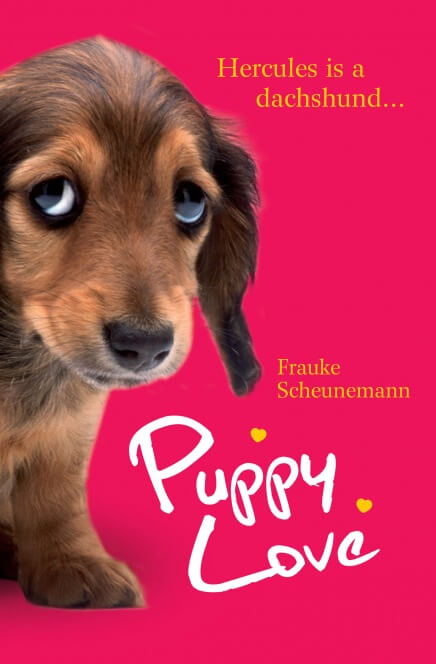Though the cover is adorable and the concept is cute, Puppy love by Frauke Scheunemann suffers from a clunky translation and muddled plot.
 lo
“I lay my head on her lap. Of course I’ll stay with you, Caroline! Even though right now my sensitive dachshund nose is suffering quite a bit from your pungent smell. I hope it goes away.”
lo
“I lay my head on her lap. Of course I’ll stay with you, Caroline! Even though right now my sensitive dachshund nose is suffering quite a bit from your pungent smell. I hope it goes away.”
– Puppy Love, by Frauke Scheunemann
Let’s get this right out of the way: the English cover of Frauke Scheunemann’s Puppy Love is the cutest freaking thing you will ever see. Featuring a tiny puppy staring out with the most soulful “I’m sorry I ate your favourite pair of shoes but you still love me, right?” expression, with a tagline proclaiming “Hercules is a dachshund…,” I could not help but pre-order myself a copy. This, coupled with House of Anansi’s “vote for your favourite puppy” contest on their blog, sealed the deal. Well done, Art and PR departments! Absolutely adorable.
The story is a straightforward chick-lit style romance about a woman named Caroline and her rotten boyfriend Thomas. The hook is that the first person narrative is from her brand new puppy’s perspective. Hercules, nee Carl-Leopold von Escherbach (and damned proud of it), was cast out of his castle because his purebred dachshund mom had a bit of a tumble with an unknown dog and the resulting litter can’t be certified purebred. Hercules has a mighty high opinion of himself, and no amount of threats from the other dogs in the pound, nor human amusement at his haughty demeanour, can bring him down a peg.
He’s saved from the bigger, meaner pound dogs when he is adopted by Caroline. His new owner is a bit of an emotional wreck who fixes violins with her business partner Daniel and naively believes that the philandering Thomas is on legitimate business trips and not cheating his brains out. Hercules and an aging tomcat, Mr. Beck, team up with a two-part plan: 1) to show Caroline Thomas’s true nature, and 2) to find her a suitable mate—no easy task when dachshund tastes don’t always match up with human ones.
And that’s really the extent of the story. Watching Hercules puppy his way through his new life is incredibly sweet as he comes to grips with leaving the castle, or brings home a man from the park who turns out to be an older homeless fellow and not a young suitor for Caroline. It’s difficult to get a real sense of characterization of any of the humans in the story because they’re all filtered through Hercules’ point of view. What is Caroline like, really? She seems nice but dippy. Her friend Nina is a bit of a stuck-up witch. Thomas is no good. Caroline’s business partner Daniel is nice but nondescript, and the vet is a bit of a mystery too. There isn’t much more depth than this, which leaves all of the human characters feeling terribly clichéd and one-dimensional.
Hercules’s best moments are when he’s adorably messing up, for example thwarting a bank robbery that’s actually a scene being filmed for a movie, or when he’s absolutely indignant that he has to wear a cone after he’s had a tick removed from his ear. Predictable but cute. His interactions with the older, wiser Mr. Beck are some of the best moments in the book, but they’re also uneven. Hercules’s vocabulary is extensive, but he’s unfamiliar with certain basic elements of his environment. The balance between wordliness and naivete isn’t quite achieved properly, so buying into the “this is a dog’s point of view” isn’t always maintained.
The translation from German to English is the biggest issue with this book. Shelley Frisch has a PhD in German literature and has won awards for her scholarly translations (including biographies of Einstein, Kafka, and Nietzsche), but this is her first work of light fiction. And it really shows. The translation is stiff as a board and doesn’t sound at all true to the English ear, with clunky sentences abounding, like “I run back and forth in a fluster and end up back at Caroline’s head. She is now lying motionless next to her vomit” and “You can imagine how I’m kicking myself.” There’s no feel for dialogue or emotion at all. The story would have benefited deeply from someone “translating” the translation into contemporary, everyday English, which would lead to a much more engaging read.
The love story is difficult to follow, too, and I was never quite sure which romantic contender I was supposed to be rooting for. The vet? The business partner? The movie star (really)? The winner seemed to come out of nowhere to me, not at all who I was expecting. I’m not sure if this is a function of the original narrative being told through a puppy’s eyes or if it’s again because of the translation.
In the end, Puppy Love is a cute book to have on my shelf, and I’m still drawn to gaze tenderly at the cover. Lacking any sort of substance or unique style, however, Puppy Love doesn’t have enough to make it stand out as an interesting read.
Two out of five blue pencils
Puppy Love, by Frauke Scheunemann, translated by Shelley Frisch. Published in Canada by House of Anansi, © 2012
Available at the House of Anansi site, Amazon, Indigo, and fine independent bookstores everywhere.

3 thoughts on “The packaging shines, but can the story keep up? A review of Puppy Love by Frauke Scheunemann”